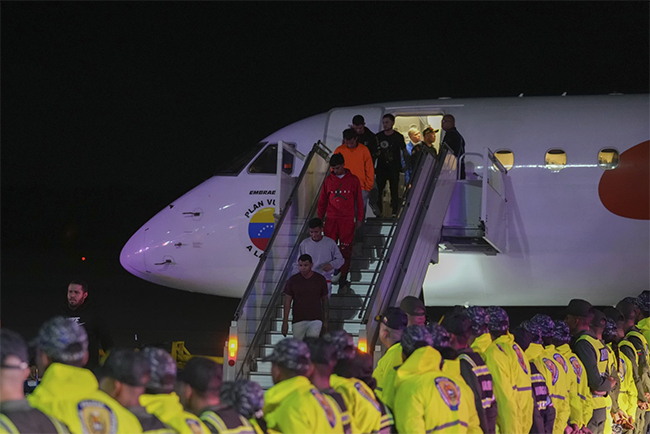by the El Reportero’s wire services
A battery of South Florida lawmakers from both sides of the political aisle have teamed up to re-introduce a bill in Congress that would give hundreds of thousands of Venezuelans in the U.S. a path to legal residency.
U.S. Reps. Debbie Wasserman Schultz, D-Weston, María Elvira Salazar, R-Miami and Frederica Wilson, D-Miami Gardens, announced this week they are sponsoring the re-introduction of H.R. 1348, the Venezuelan Adjustment Act, for Venezuelans who entered U.S. before or on December 31, 2021.
The legislation faces a steep hill to climb on Capitol Hill, where the House and Senate are moving swiftly to back President Donald Trump’s crackdown on illegal immigration.
“The Venezuelan Adjustment Act will give security and peace of mind to tens of thousands of Venezuelans who have fled a murderous, totalitarian regime,” Wasserman Schultz, whose congressional district includes one of the nation’s largest Venezuelan-American communities, said in a statement.
“As Trump closes off legal pathways for migrants, we need this legislation to re-open the door for those who should have the opportunity to become permanent legal residents as Cubans have been able to for years,” she said referring to the Cuban Adjustment Act, which allowed Cubans to flee the communist island nation.
Salazar said the regime of Venezuela’s President Nicolás Maduro has forced millions of Venezuelans to leave the country because of decades of economic and political upheaval.
“As long as Maduro forcibly remains in power, this crisis will only get worse,” said Salazar in a statement. “I am proud to reintroduce the Venezuelan Adjustment Act to provide refuge for those who have endured incredible suffering, so they do not have to return home to face the wrath of the dictatorship.”
Said Wilson in a statement: “Sending [Venezuelans] back isn’t just wrong — it’s inhumane. I’m proud to support a legal pathway for certain Venezuelan nationals in the U.S. because abandoning them in their time of need is not an option.”
The proposed legislation specifically benefitting Venezuelans comes only weeks after the Trump’s administration said it was ending protections that shielded roughly 350,000 Venezuelans from deportation, leaving them with less than two months before they lose their right to work in the U.S.
Homeland Security Secretary Kristi Noem’s order affects 348,202 Venezuelans living in the U.S. with Temporary Protected Status, or TPS, which is slated to expire in April. That’s about half of the approximately 600,000 who have TPS. The remaining protections are set to expire at the end of September.
The decision by the administration is among the latest actions targeting the immigration system, as officials work to make good on Trump’s campaign promises of cracking down on people illegally living in the country and to carry out the largest mass deportation effort in U.S. history.
In making its decision, the Department of Homeland Security said conditions had improved enough in Venezuela to warrant ending protective status.
“The sheer numbers have resulted in associated difficulties in local communities,” the secretary’s decision says. She cited members of the Venezuelan gang Tren de Aragua as among those coming to the U.S.
The gang originated in a lawless prison in the central state of Aragua more than a decade ago but has expanded in recent years as millions of desperate Venezuelans fled Maduro’s rule and migrated to other parts of Latin America or the U.S.
During his campaign, Trump repeatedly hammered at dangers posed by the gang, sparking criticism that he was painting all immigrants as criminals.
More than 7.7 million Venezuelans have left their home country since 2013, when its economy unraveled and Maduro took office. Most settled in Latin America and the Caribbean, but after the pandemic, migrants increasingly set their sights on the U.S.
The country’s protracted crisis obliterated the middle class and pushed millions into poverty.
Politically, the country is at an impasse after Maduro was sworn in for a third six-year term last month despite credible evidence that former diplomat Edmundo González, who represented the U.S.-backed opposition coalition in the July election, defeated him by a more than 2-to-1 margin.
Immigration advocates and Venezuelan activists in South Florida dispute Noemi’s assessment of Venezuela, saying conditions have not improved and that it’s not safe to send people back.
In the waning days of the Biden administration, Noem’s predecessor, Alejandro Mayorkas, extended the protections for Venezuelans until October 2026. Noem revoked that decision.
– The Associated Press contributed to this story.



